
Are you using WhatsApp to enhance your ecommerce business? In this blog post, we’ll explore what WhatsApp ecommerce is and its benefits. Next, we’ll show you the different ways to set up WhatsApp ecommerce. Finally, we’ll demonstrate the benefits of integrating WhatsApp API into your ecommerce platform.
What is WhatsApp Ecommerce?
WhatsApp ecommerce involves using WhatsApp for online shopping. Businesses can leverage its large user base and accessibility to boost sales and provide customer service.
Firstly, businesses can create product catalogs for customers to browse and make product inquiries, while orders can be conveniently placed through WhatsApp via messages or automated forms.
Additionally, it serves as an effective platform for customer support by allowing agents to easily address inquiries, offer recommendations, resolve concerns and provide post-purchase assistance.
Next, we’ll take a look at some of the benefits of using WhatsApp for your ecommerce business.
Benefits of Using WhatsApp Ecommerce Store
WhatsApp ecommerce offers numerous advantages for businesses looking to expand their online presence and boost sales.
Firstly, WhatsApp’s massive user base of over 2 billion active users worldwide provides businesses with a vast pool of potential customers. As a widely used platform for instant messaging, WhatsApp offers a convenient and familiar channel for consumers to communicate with businesses.
It also allows users to have real-time conversations with businesses. Unlike webchat and email, which often involve delays in responses, WhatsApp offers immediate interaction. This makes it ideal for time-sensitive queries, urgent support and quick decision-making while purchase intent is still high.
Leveraging WhatsApp for ecommerce is a time- and cost-effective solution for small businesses compared to managing separate ecommerce and communication platforms. It offers an accessible and scalable platform without requiring significant investments.
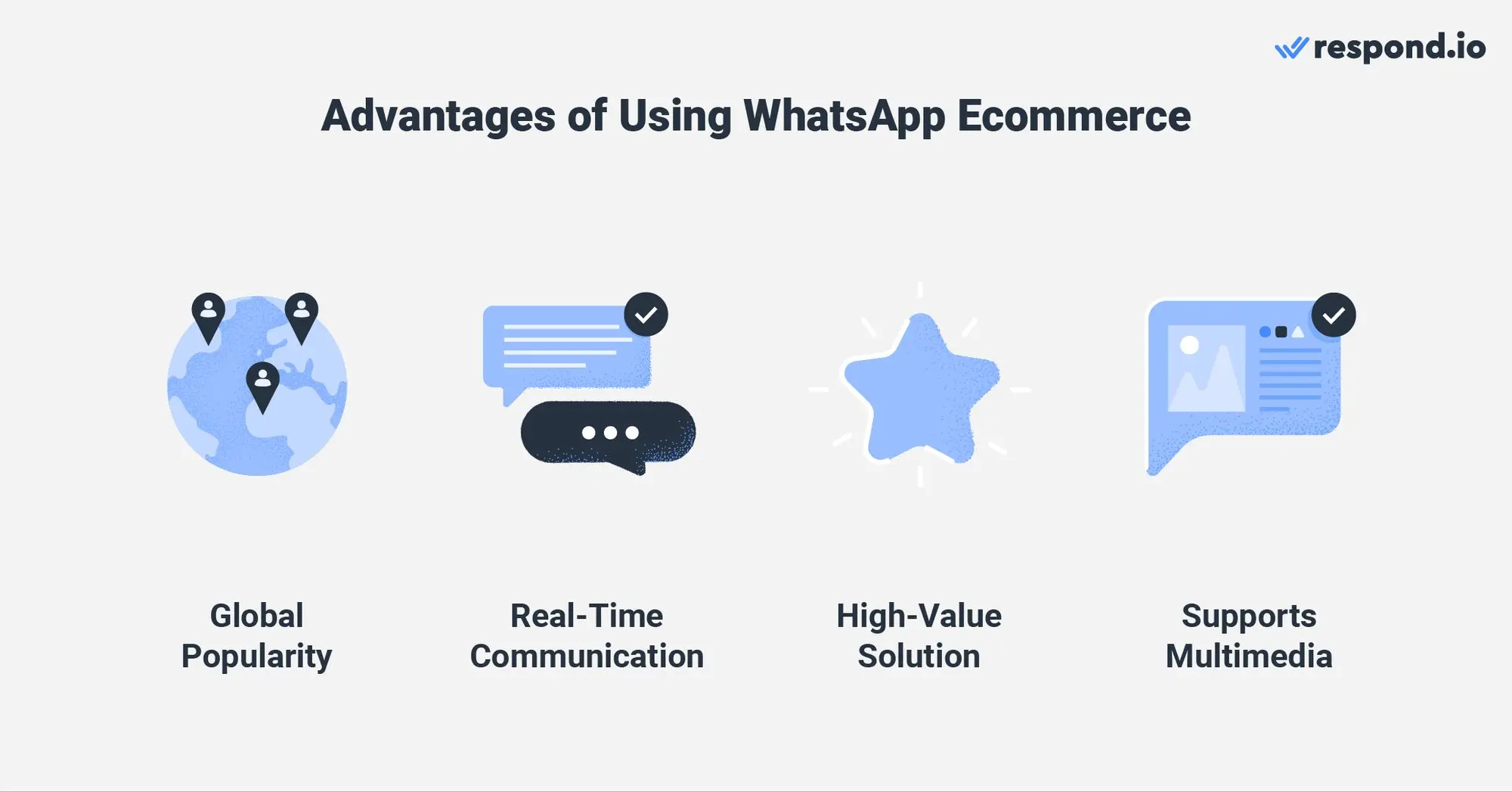
Meanwhile, medium and large enterprises can use it as a high-value messaging channel to support ecommerce activities.
WhatsApp surpasses email by supporting multimedia content like images, videos, audio messages and documents. While webchat may support some multimedia messages, WhatsApp's ability to display a wide range of multimedia formats positions it as the superior choice for conveying information.
With these advantages in mind, let’s explore how businesses can use WhatsApp to leverage the channel’s features next.
Turn conversations into customers with respond.io's official WhatsApp API. ✨
Manage WhatsApp calls and chats in one place!
How Sharwa is Succeeding with WhatsApp API for Ecommerce
Here we’ll take a look at a real-life example of how an ecommerce business takes advantage of WhatsApp to improve its overall communication.
Sharwa, an Egyptian social commerce platform, sought to improve its communication strategy and boost its low customer satisfaction (CSAT) scores. Its existing methods were inefficient and failed to meet customer expectations, leading to frustration and negative feedback.

To overcome this, Sharwa connected WhatsApp API to respond.io, a customer conversation management software. Now, it leverages respond.io’s advanced automation capabilities (e.g. WhatsApp auto reply) and omnichannel support to improve response times and provide personalized assistance.
As it began to effectively address customer concerns, build trust and foster long-term relationships, Sharwa secured an impressive 85% CSAT score and gets repeat business from 50% of its customers.
Next, we’ll take a look at how ecommerce businesses can use WhatsApp to take their business to the next level.
How to Use WhatsApp Ecommerce Store
To harness the full potential of WhatsApp for your ecommerce business, it’s important to understand two Whatsapp products — WhatsApp Business App and WhatsApp API — and how they benefit your business.
The WhatsApp Business App is catered for small businesses. It allows you to connect up to 10 devices if you use WhatsApp Business Premium, in which you can access available Premium tools like a detailed WhatsApp web page.
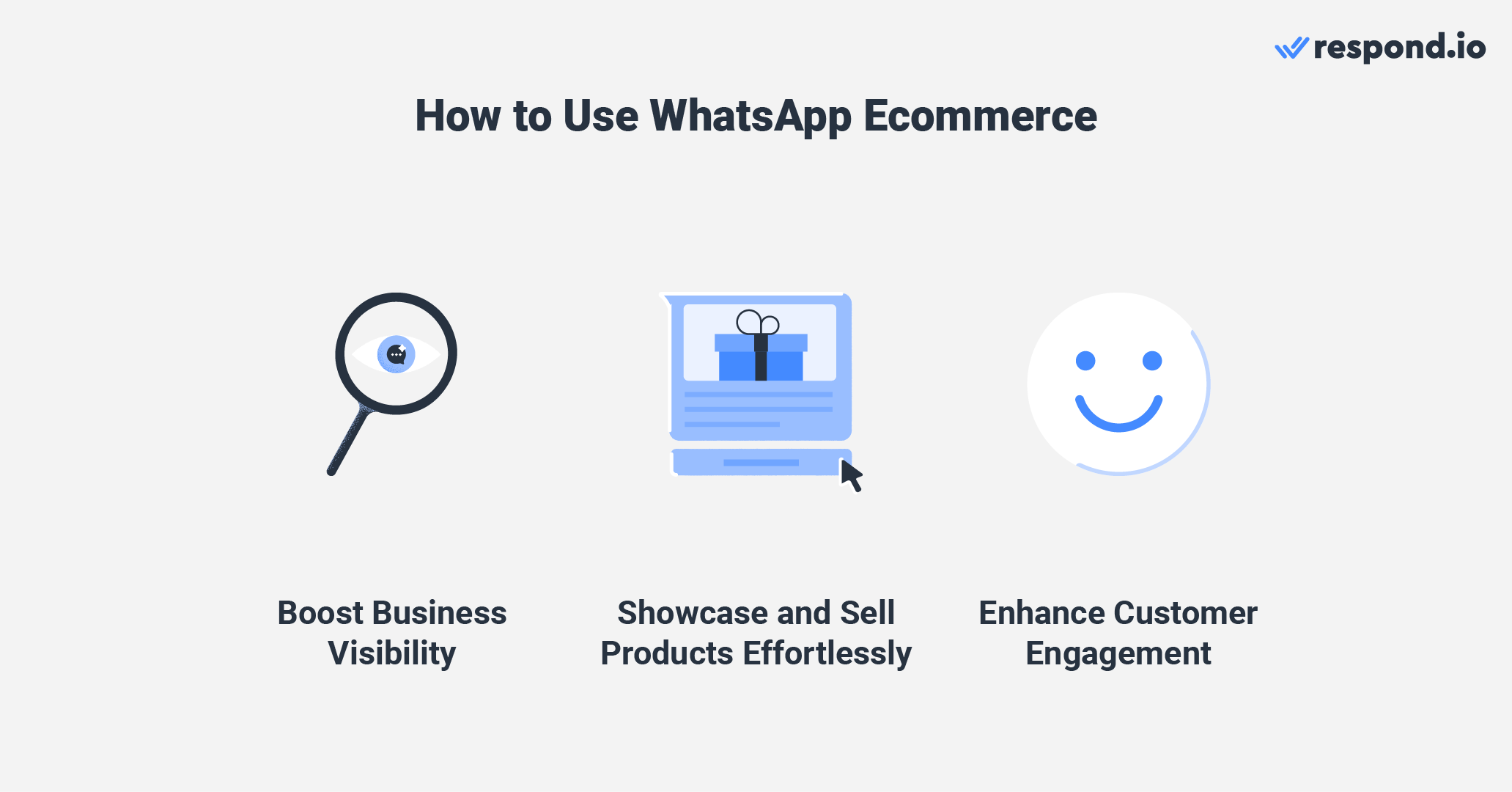
On the other hand, the WhatsApp API is designed for medium to large businesses that aim to leverage WhatsApp with multiple users. However, you should note that WhatsApp API does not come with its own interface. Instead, it needs to be integrated with messaging software like respond.io to send and receive messages (e.g., when sending WhatsApp bulk messages beyond WhatsApp Business’s limits).
Now, we’ll delve into how businesses can effectively use WhatsApp to optimize their online sales and provide exceptional customer service.
WhatsApp Business Ecommerce: Boost Business Visibility
To boost your small business’ exposure in today’s competitive landscape, strategically leverage features like the WhatsApp Business Directory. Optimize your profile with relevant information to increase visibility and showcase your offerings.
WhatsApp API for Ecommerce: Showcase and Sell Products Effortlessly
To enhance sales, use WhatsApp Catalog to display product or service descriptions, pricing and images. WhatsApp Shopping Cart, an extension of the WhatsApp Catalog, enables customers to select products they want, set the quantities of each item they wish to purchase and check them out.
WhatsApp for Ecommerce: Enhance Customer Engagement
One easy way to boost customer engagement is by utilizing Facebook and Instagram click-to-chat ads, as well as WhatsApp QR codes. These tools can significantly enhance your business’s visibility, expand your reach to a broader audience, attract potential customers and maximize your brand’s presence in the market.
Next, we’ll share how the respond.io customer conversation management software can level up your ecommerce business with its purpose-built solution and advanced messaging features.
WhatsApp API for Ecommerce: Quick Wins with Respond.io
In this section, we will delve into the numerous benefits of integrating the WhatsApp API with your ecommerce platform via respond.io to drive sales and enhance the customer experience.
Create and Send Product Messages on Respond.io
Creating engaging product messages is key to capturing customer interest and driving sales. On respond.io, you can create and send these product marketing messages:
Catalog message: Craft a template that showcases your entire catalog with a clickable link, making it easy for customers to browse and interact with your products.
Multi-product message: Select multiple products to feature in a single message, ideal for promotions or highlighting new arrivals.
Note: You need to upload the products to your Commerce Manager and connect it to respond.io. The products uploaded in the Commerce Manager will sync on the respond.io platform.
You can send these messages through various modules in respond.io, such as the Broadcast, Workflows, and Messages modules. Integration with platforms like Make.com and Zapier further enhances your ability to automate and tailor your marketing strategies.
Consolidate All Communication Channels in an Omnichannel Inbox
Having a centralized inbox that consolidates all communication channels is crucial. This is because ecommerce businesses often receive messages from multiple channels or accounts on the same platform. Using a single inbox can help to avoid missing any inquiries.
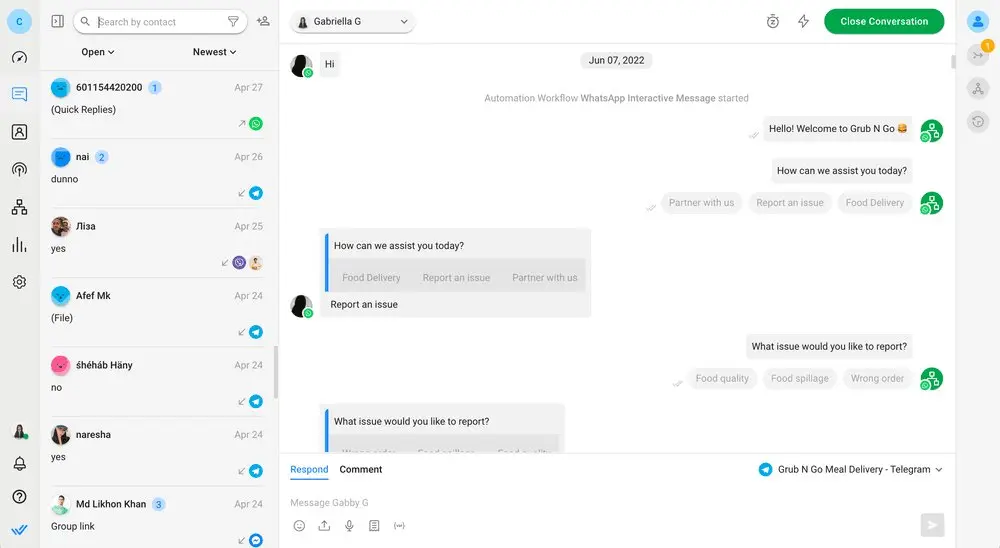
Respond.io's omnichannel inbox provides an efficient solution for managing customer inquiries from WhatsApp, Facebook Messenger, Telegram, Viber, Google Business Messages and custom or in-app messaging channels like Lazada chat.
This enables businesses to streamline their communication processes, manage inquiries more efficiently, and respond promptly to customer queries, ultimately enhancing the overall customer experience.
Drive Engagement from Multiple Touchpoints
In addition to creating WhatsApp chat links and QR codes on respond.io, leverage WhatsApp widgets or omnichannel widgets to effectively convert website visitors into leads while ensuring that all interactions are directed to one inbox.
Automate Tasks with Advanced Automation
The WhatsApp API revolutionizes communication by enabling ecommerce businesses to save time and enhance efficiency in customer interactions. Here are several ways you can use respond.io’s advanced automation to achieve this.
Integrate Your Sales CRMs to Shorten Sales Cycle
By integrating your ecommerce platform, such as one that supports WhatsApp CRM, with respond.io, you can seamlessly exchange data between both systems, empowering you to qualify leads and create deals with a click. Your agents can effortlessly handle sales-related tasks while chatting with customers, eliminating the need to switch between platforms.
In addition, businesses can automate various sales tasks such as lead qualification, based on specific funnel criteria. Leads are then automatically routed to the appropriate sales team and assigned to the most suitable or available sales agent.
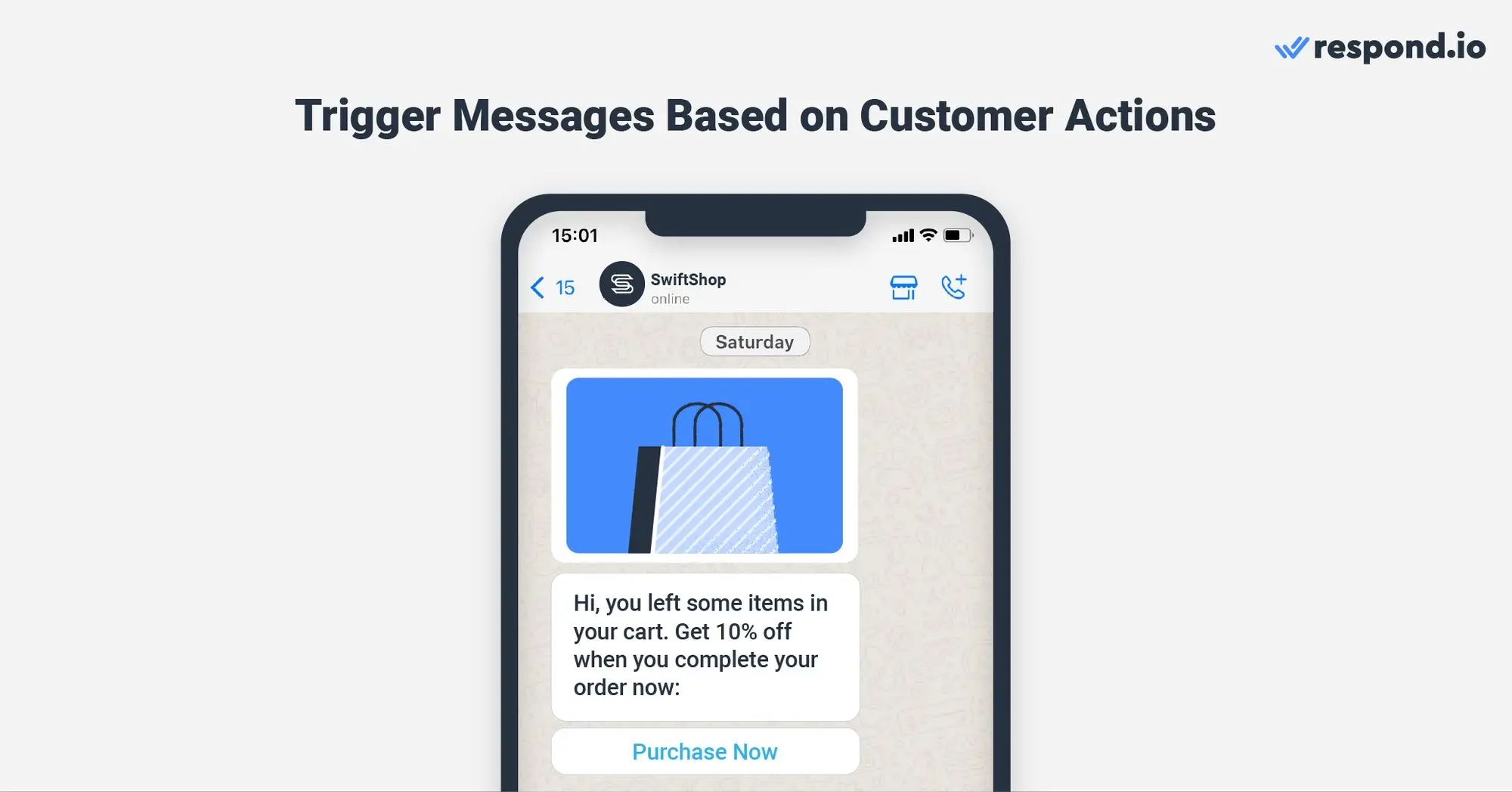
You can also capture the attention of potential customers by triggering messages based on customer actions on external platforms. Respond.io allows you to send personalized promotional messages when you integrate it with popular ecommerce platforms like Shopify, Magento, WooCommerce and more.
With this integration, customers who have added products to their cart but have not completed their purchases can receive abandoned cart recovery notifications. You can also use the platform to update customers’ contact details and send order confirmations and shipping updates.
Streamline Customer Support with an Automated WhatsApp Menu
Ecommerce businesses can enhance customer support and address inquiries efficiently by implementing a WhatsApp menu. Using Workflows on respond.io, businesses can automate chat menu systems to cater to commonly asked questions related to products, orders and customer service.
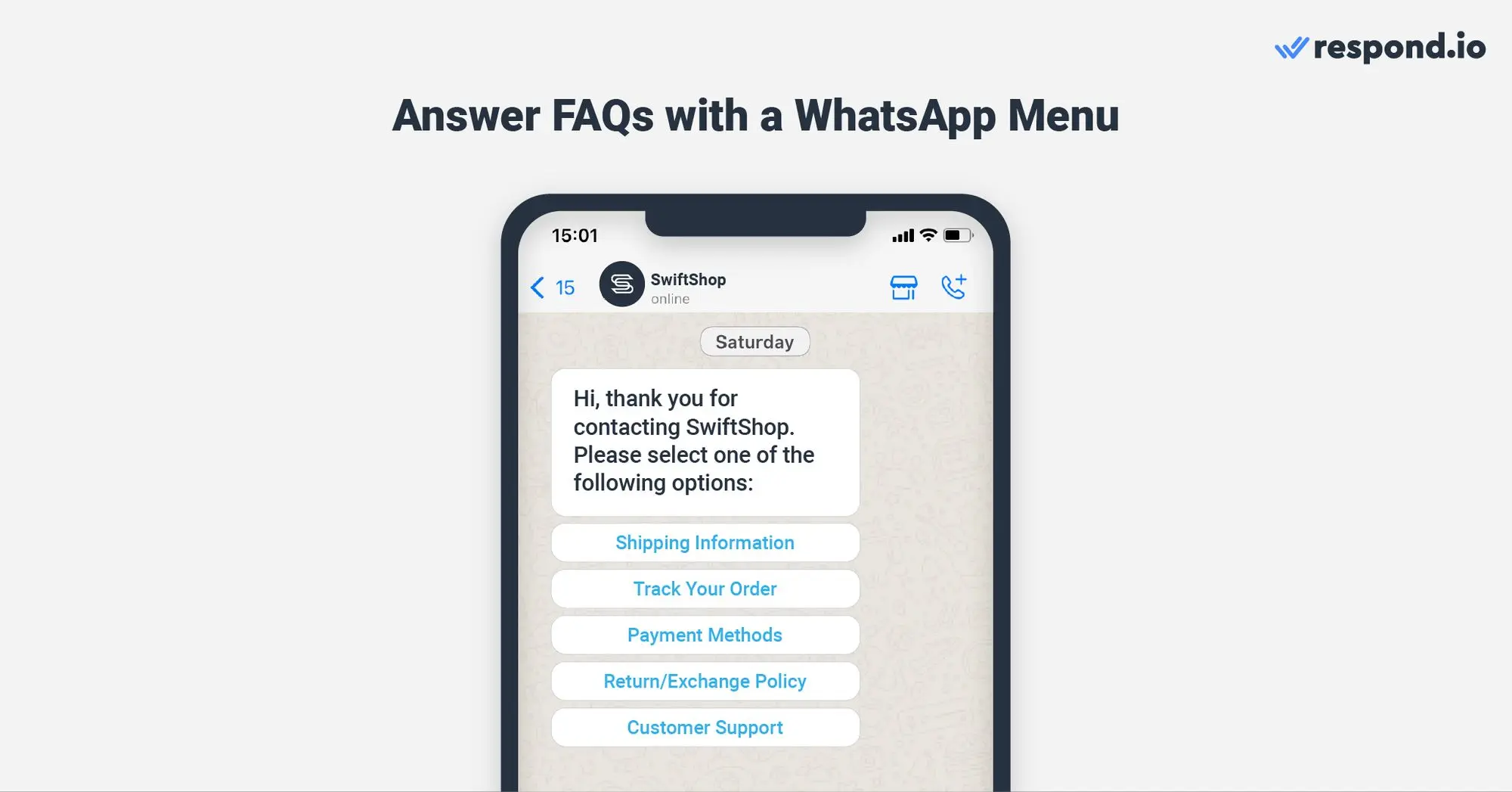
This menu enables customers to navigate and find the information easily, with the option to connect with a support agent for assistance. This saves time for both businesses and customers, thus enhancing the brand experience.
Send Post-Purchase Surveys for Valuable Insights and Feedback
Asking for feedback from customers is a valuable method to enhance customer support services and improve the overall shopping experience. Utilize respond.io's CSAT Workflow template to send surveys to customers that allow them to rate their experience and provide feedback.
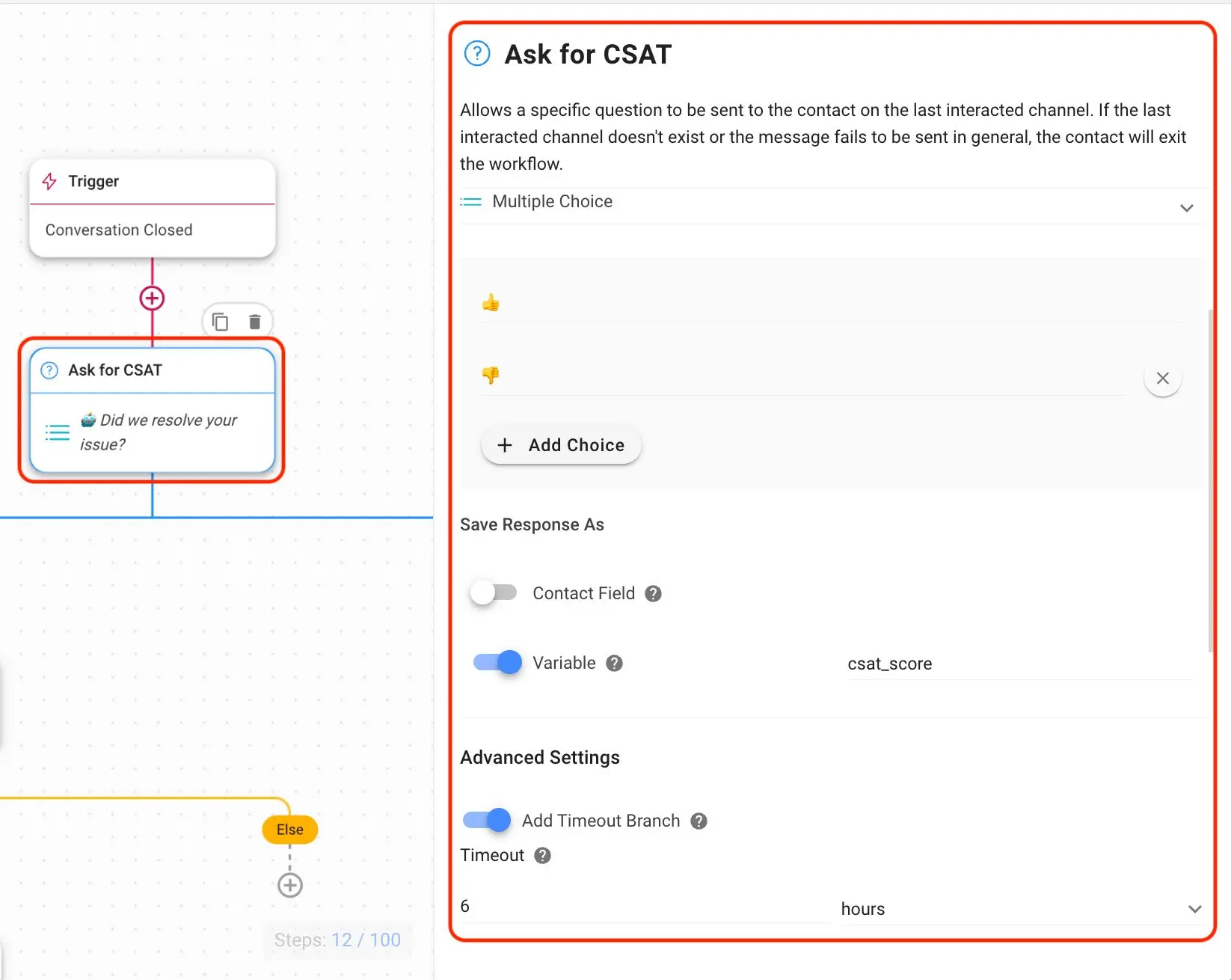
You can store feedback in Google Sheets or your data warehouse via an HTTP request. This aids in tracking and improving support quality to ensure high customer satisfaction.
Send Targeted WhatsApp Broadcasts to Maximize Engagement
Ecommerce businesses can use WhatsApp broadcasts to send promotions or updates in bulk. This includes seasonal promotions, announcing new product releases or flash deals to loyal customers.
With respond.io's Broadcasts Module, businesses can reach a wide audience across all connected messaging channels with a single broadcast. This streamlined approach ensures important updates and promotions are directly delivered to the intended recipients.
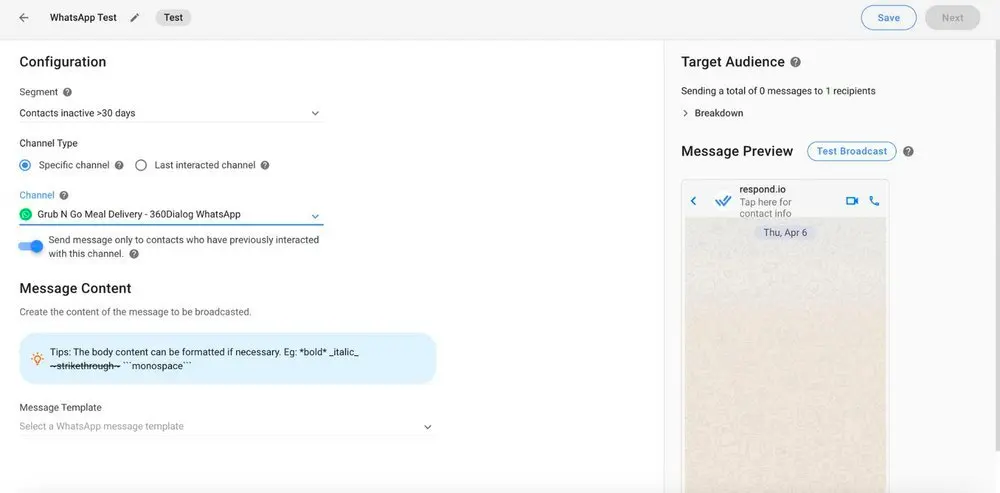
It also enhances broadcast campaigns with features like contact import, precise segmentation, message personalization, advanced scheduling and the ability to clone recurring broadcasts. These capabilities enable tailored messages to be delivered at the right time to maximize engagement.
To sum it up, WhatsApp has demonstrated its value as a tool for ecommerce businesses, enabling effective marketing, increased sales and enhanced customer support. Looking to leverage WhatsApp API with an official WhatsApp Business Solution Provider? Create a respond.io account and connect your WhatsApp API today.
Turn conversations into customers with respond.io's official WhatsApp API. ✨
Manage WhatsApp calls and chats in one place!
Further Reading
Interested to know what else you can do to boost your ecommerce business? Check out some of these articles below:






































 Electronics
Electronics Fashion & Apparel
Fashion & Apparel Furniture
Furniture Jewelry and Watches
Jewelry and Watches
 Afterschool Activities
Afterschool Activities Sport & Fitness
Sport & Fitness
 Beauty Center
Beauty Center Dental Clinic
Dental Clinic Medical Clinic
Medical Clinic
 Home Cleaning & Maid Services
Home Cleaning & Maid Services Photography & Videography
Photography & Videography
 Car Dealership
Car Dealership
 Travel Agency & Tour Operator
Travel Agency & Tour Operator




